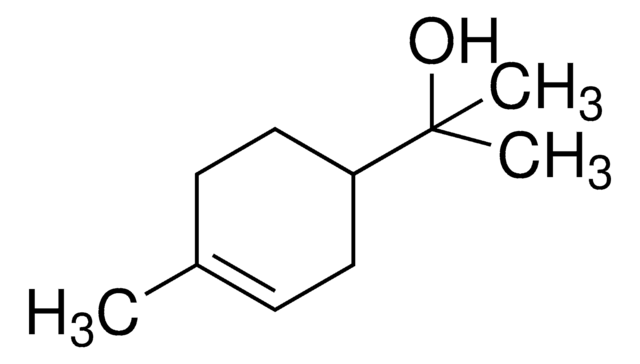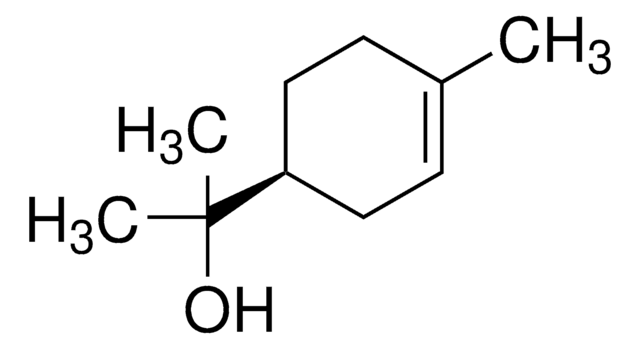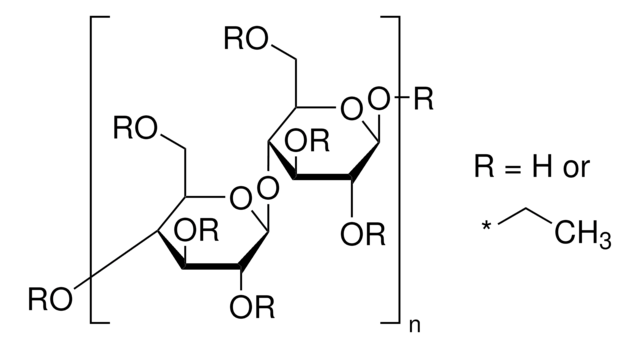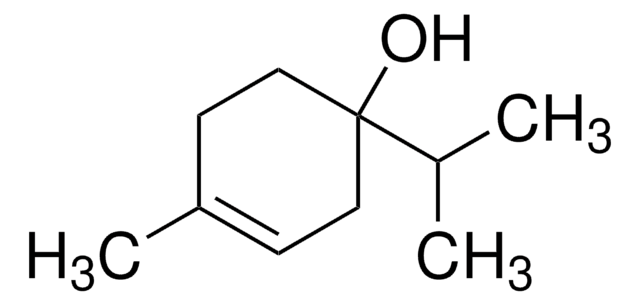432628
α-Terpineol
90%, technical grade
Synonym(s):
alpha-Terpineol
Sign Into View Organizational & Contract Pricing
All Photos(1)
About This Item
Empirical Formula (Hill Notation):
C10H18O
CAS Number:
Molecular Weight:
154.25
Beilstein:
2325137
EC Number:
MDL number:
UNSPSC Code:
12352212
PubChem Substance ID:
NACRES:
NA.22
Recommended Products
grade
technical grade
Quality Level
Assay
90%
refractive index
n20/D 1.482 (lit.)
bp
217-218 °C (lit.)
mp
31-35 °C (lit.)
density
0.93 g/mL at 25 °C (lit.)
SMILES string
CC1=CC[C@H](CC1)C(C)(C)O
InChI
1S/C10H18O/c1-8-4-6-9(7-5-8)10(2,3)11/h4,9,11H,5-7H2,1-3H3
InChI key
WUOACPNHFRMFPN-UHFFFAOYSA-N
Looking for similar products? Visit Product Comparison Guide
Related Categories
General description
α-Terpineol is a monoterpene alcohol. It is one of the components responsible for the antifungal activity in Melaleuca alternifolia (tea tree) essential oil. The reaction rate constant of α-terpineol with the OH radical and ozone was found to be (1.9±0.5)×10-10cm3 molecule-1s-1 and (3.0±0.2)×10-16cm3 molecule-1s-1, respectively.
Application
- a-Terpineol, a natural monoterpene: A review of its biological properties: This review article explores the wide range of biological activities of a-terpineol, including antimicrobial, anti-inflammatory, and anticancer properties, providing a comprehensive overview of its therapeutic potential (C Khaleel, N Tabanca, G Buchbauer, 2018).
- Production, properties, and applications of a-terpineol: Discusses the production methods, physical and chemical properties, and various industrial applications of a-terpineol, highlighting its importance in food and bioprocess technologies (A Sales et al., 2020).
- Antifungal activity of citral, octanal and a-terpineol against Geotrichum citri-aurantii: This article examines the effectiveness of a-terpineol, along with other compounds, in inhibiting the growth of a fungal pathogen affecting citrus fruits, showcasing its potential as a natural fungicide (H Zhou et al., 2014).
Other Notes
Optical rotation varies with isomer mix.
remainder γ-isomer
Signal Word
Warning
Hazard Statements
Precautionary Statements
Hazard Classifications
Eye Irrit. 2 - Skin Irrit. 2
Storage Class Code
10 - Combustible liquids
WGK
WGK 1
Flash Point(F)
195.8 °F - closed cup
Flash Point(C)
91 °C - closed cup
Personal Protective Equipment
dust mask type N95 (US), Eyeshields, Gloves
Choose from one of the most recent versions:
Already Own This Product?
Find documentation for the products that you have recently purchased in the Document Library.
Customers Also Viewed
Annarica Calcabrini et al.
The Journal of investigative dermatology, 122(2), 349-360 (2004-03-11)
The search for innovative therapeutic approaches based on the use of new substances is gaining more interest in clinical oncology. In this in vitro study the potential anti-tumoral activity of tea tree oil, distilled from Melaleuca alternifolia, was analyzed against
Francesca Mondello et al.
BMC infectious diseases, 6, 158-158 (2006-11-07)
Recent investigations on the antifungal properties of essential oil of Melaleuca alternifolia Cheel (Tea Tree Oil, TTO) have been performed with reference to the treatment of vaginal candidiasis. However, there is a lack of in vivo data supporting in vitro
P H Hart et al.
Inflammation research : official journal of the European Histamine Research Society ... [et al.], 49(11), 619-626 (2000-12-29)
To evaluate potential antiinflammatory properties of tea tree oil, the essential oil steam distilled from the Australian native plant, Melaleuca alternifolia. The ability of tea tree oil to reduce the production in vitro of tumour necrosis factor-alpha (TNFalpha), interleukin (IL)-1beta
Soon-Nang Park et al.
Anaerobe, 18(3), 369-372 (2012-04-28)
Linalool and α-terpineol exhibited strong antimicrobial activity against periodontopathic and cariogenic bacteria. However, their concentration should be kept below 0.4 mg/ml if they are to be used as components of toothpaste or gargling solution. Moreover, other compounds with antimicrobial activity
Jason E Ham et al.
Chemosphere, 83(3), 327-333 (2011-01-18)
Indoor environments are dynamic reactors where consumer products (such as cleaning agents, deodorants, and air fresheners) emit volatile organic compounds (VOCs) that can subsequently interact with indoor oxidants such as ozone (O(3)), hydroxyl radicals, and nitrate radicals. Typically, consumer products
Our team of scientists has experience in all areas of research including Life Science, Material Science, Chemical Synthesis, Chromatography, Analytical and many others.
Contact Technical Service





